

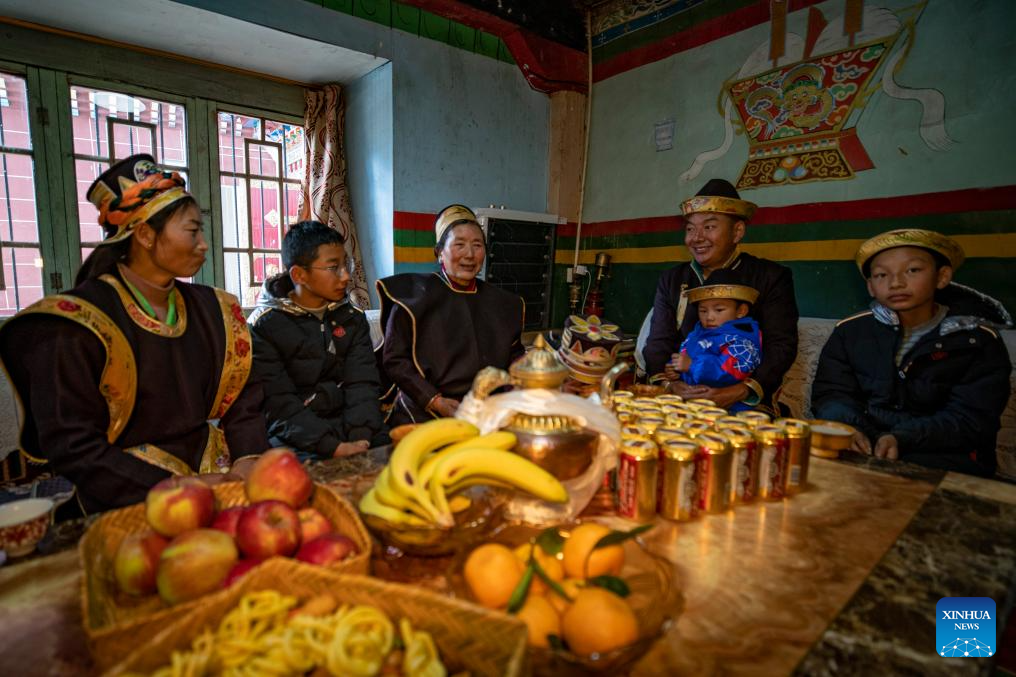
Tsering Toinzhub (2nd R) and Lhagba Zhoima (1st L) drink buttered tea with their family in Suosong Village of Nyingchi, southwest China's Xizang Autonomous Region, Nov. 14, 2023.
Locals in Nyingchi follow the tradition to celebrate their special New Year, known as the Gongbo New Year, on Oct. 1 by the Tibetan calendar, which fell on Nov. 14 this year. Tsering Toinzhub and Lhagba Zhoima have run a homestay since 2013, bringing in more than one million yuan (about 137,187 U.S. dollars) every year. For their family, the traditional Gongbo New Year is still the most important festival. (Xinhua/Jiang Fan)
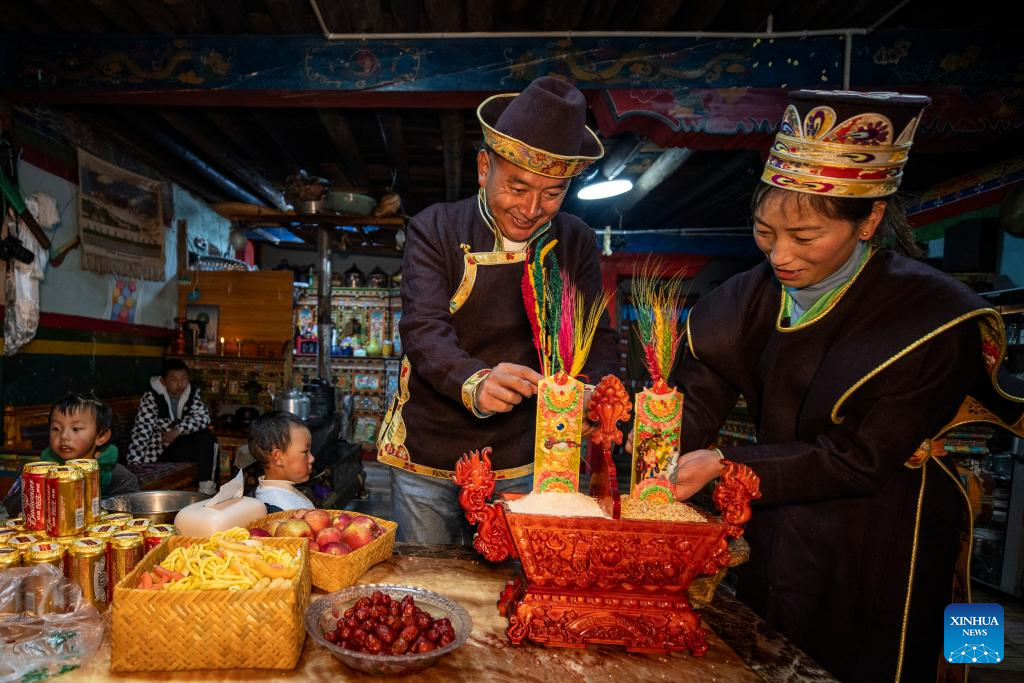
Tsering Toinzhub (L) and Lhagba Zhoima prepare chema, a two-tier rectangular wooden box containing roasted barley and fried wheat grain, in Suosong Village of Nyingchi, southwest China's Xizang Autonomous Region, Nov. 13, 2023.
Locals in Nyingchi follow the tradition to celebrate their special New Year, known as the Gongbo New Year, on Oct. 1 by the Tibetan calendar, which fell on Nov. 14 this year. Tsering Toinzhub and Lhagba Zhoima have run a homestay since 2013, bringing in more than one million yuan (about 137,187 U.S. dollars) every year. For their family, the traditional Gongbo New Year is still the most important festival. (Xinhua/Jiang Fan)
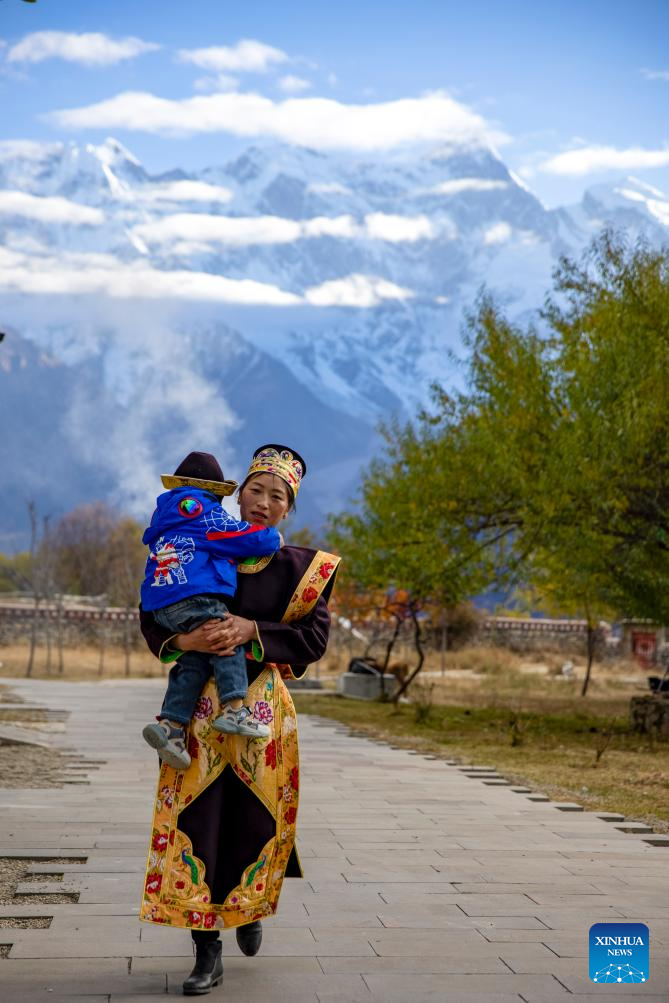
Lhagba Zhoima is pictured in Suosong Village of Nyingchi, southwest China's Xizang Autonomous Region, Nov. 14, 2023.
Locals in Nyingchi follow the tradition to celebrate their special New Year, known as the Gongbo New Year, on Oct. 1 by the Tibetan calendar, which fell on Nov. 14 this year. Tsering Toinzhub and Lhagba Zhoima have run a homestay since 2013, bringing in more than one million yuan (about 137,187 U.S. dollars) every year. For their family, the traditional Gongbo New Year is still the most important festival. (Xinhua/Huang Yaoman)

Tsering Toinzhub (1st L) and Lhagba Zhoima (3rd L) pose for a photo with their family in Suosong Village of Nyingchi, southwest China's Xizang Autonomous Region, Nov. 14, 2023.
Locals in Nyingchi follow the tradition to celebrate their special New Year, known as the Gongbo New Year, on Oct. 1 by the Tibetan calendar, which fell on Nov. 14 this year. Tsering Toinzhub and Lhagba Zhoima have run a homestay since 2013, bringing in more than one million yuan (about 137,187 U.S. dollars) every year. For their family, the traditional Gongbo New Year is still the most important festival. (Xinhua/Huang Yaoman)
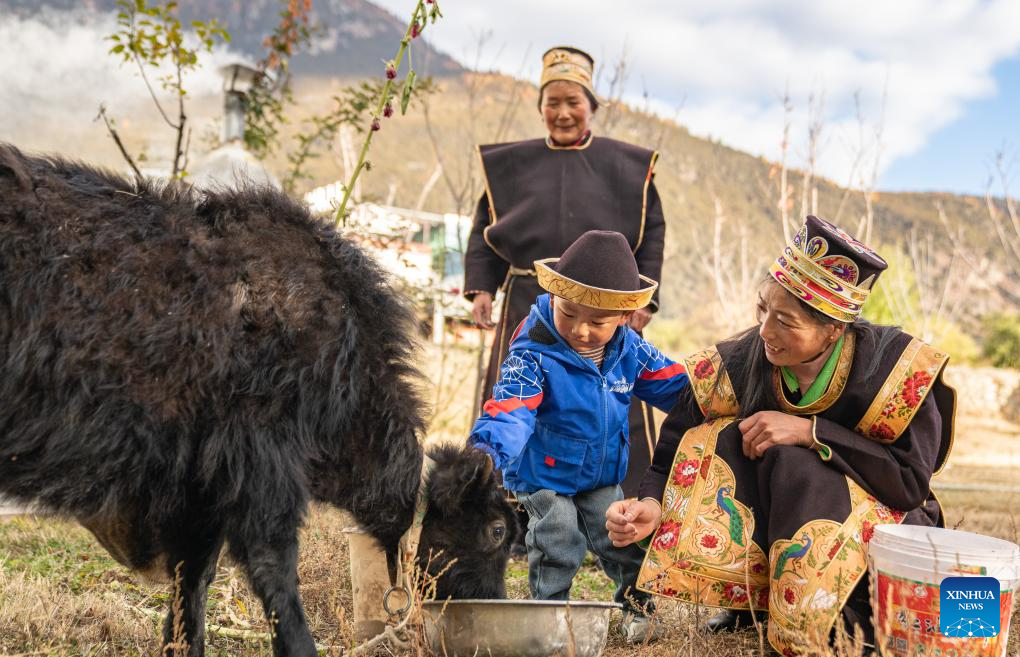
Lhagba Zhoima (1st R) feeds cattle in Suosong Village of Nyingchi, southwest China's Xizang Autonomous Region, Nov. 14, 2023.
Locals in Nyingchi follow the tradition to celebrate their special New Year, known as the Gongbo New Year, on Oct. 1 by the Tibetan calendar, which fell on Nov. 14 this year. Tsering Toinzhub and Lhagba Zhoima have run a homestay since 2013, bringing in more than one million yuan (about 137,187 U.S. dollars) every year. For their family, the traditional Gongbo New Year is still the most important festival. (Xinhua/Tenzin Nyida)
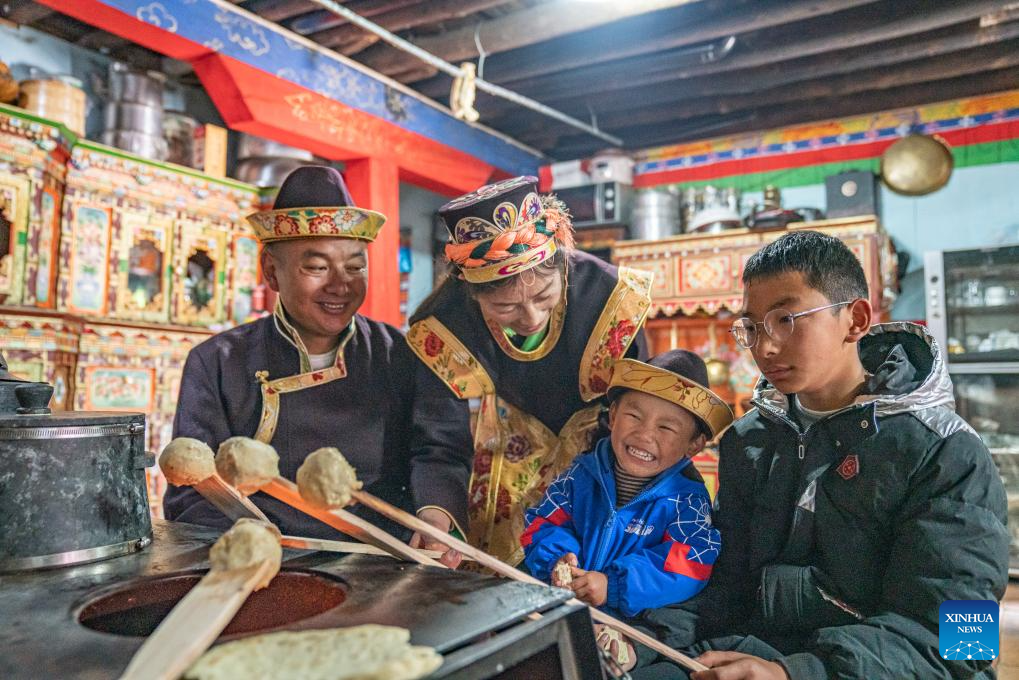
Tsering Toinzhub (1st L) and Lhagba Zhoima (2nd L) enjoy traditional food with their family in Suosong Village of Nyingchi, southwest China's Xizang Autonomous Region, Nov. 14, 2023.
Locals in Nyingchi follow the tradition to celebrate their special New Year, known as the Gongbo New Year, on Oct. 1 by the Tibetan calendar, which fell on Nov. 14 this year. Tsering Toinzhub and Lhagba Zhoima have run a homestay since 2013, bringing in more than one million yuan (about 137,187 U.S. dollars) every year. For their family, the traditional Gongbo New Year is still the most important festival. (Xinhua/Tenzin Nyida)
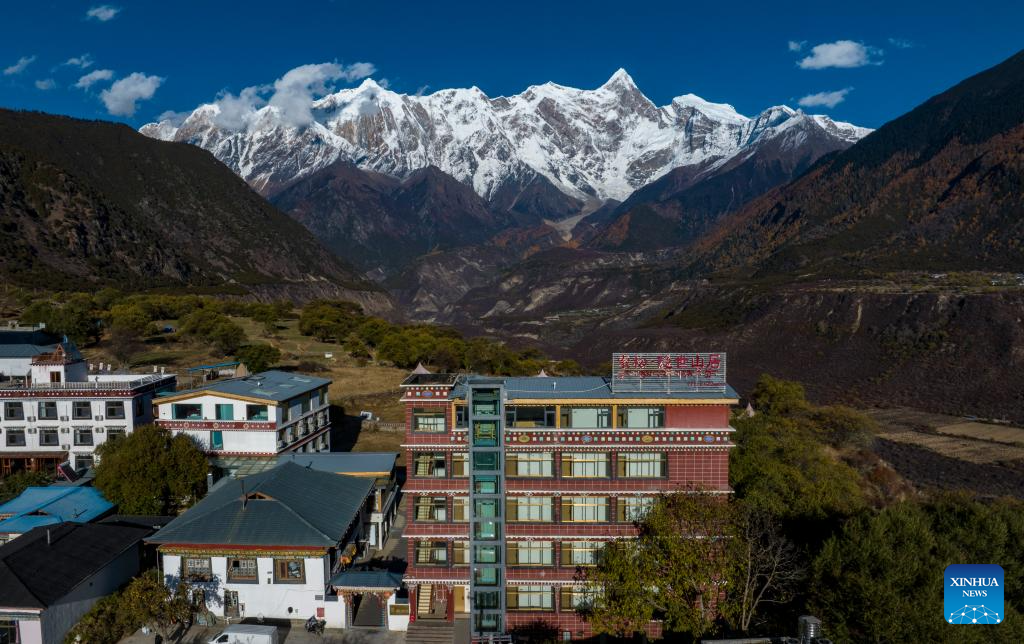
This aerial photo taken on Nov. 13, 2023 shows a homestay run by Tsering Toinzhub and Lhagba Zhoima in Suosong Village of Nyingchi, southwest China's Xizang Autonomous Region.
Locals in Nyingchi follow the tradition to celebrate their special New Year, known as the Gongbo New Year, on Oct. 1 by the Tibetan calendar, which fell on Nov. 14 this year. Tsering Toinzhub and Lhagba Zhoima have run a homestay since 2013, bringing in more than one million yuan (about 137,187 U.S. dollars) every year. For their family, the traditional Gongbo New Year is still the most important festival. (Xinhua/Jiang Fan)
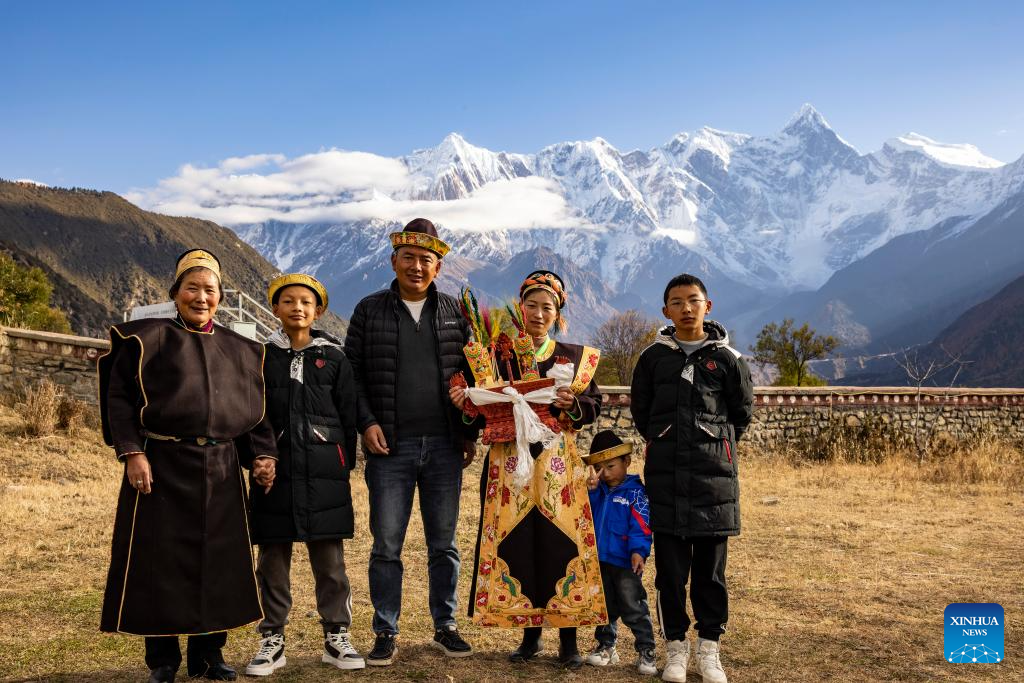
Tsering Toinzhub (3rd L) and Lhagba Zhoima (4th L) pose for a photo with their family in Suosong Village of Nyingchi, southwest China's Xizang Autonomous Region, Nov. 14, 2023.
Locals in Nyingchi follow the tradition to celebrate their special New Year, known as the Gongbo New Year, on Oct. 1 by the Tibetan calendar, which fell on Nov. 14 this year. Tsering Toinzhub and Lhagba Zhoima have run a homestay since 2013, bringing in more than one million yuan (about 137,187 U.S. dollars) every year. For their family, the traditional Gongbo New Year is still the most important festival. (Xinhua/Jiang Fan)
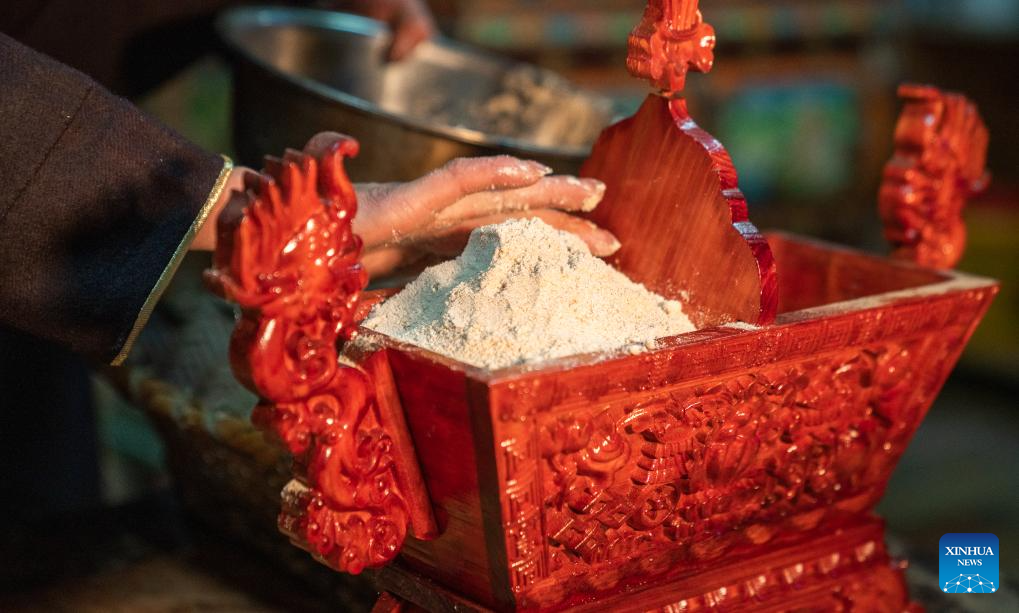
Lhagba Zhoima prepares chema, a two-tier rectangular wooden box containing roasted barley and fried wheat grain, in Suosong Village of Nyingchi, southwest China's Xizang Autonomous Region, Nov. 13, 2023.
Locals in Nyingchi follow the tradition to celebrate their special New Year, known as the Gongbo New Year, on Oct. 1 by the Tibetan calendar, which fell on Nov. 14 this year. Tsering Toinzhub and Lhagba Zhoima have run a homestay since 2013, bringing in more than one million yuan (about 137,187 U.S. dollars) every year. For their family, the traditional Gongbo New Year is still the most important festival. (Xinhua/Tenzin Nyida)
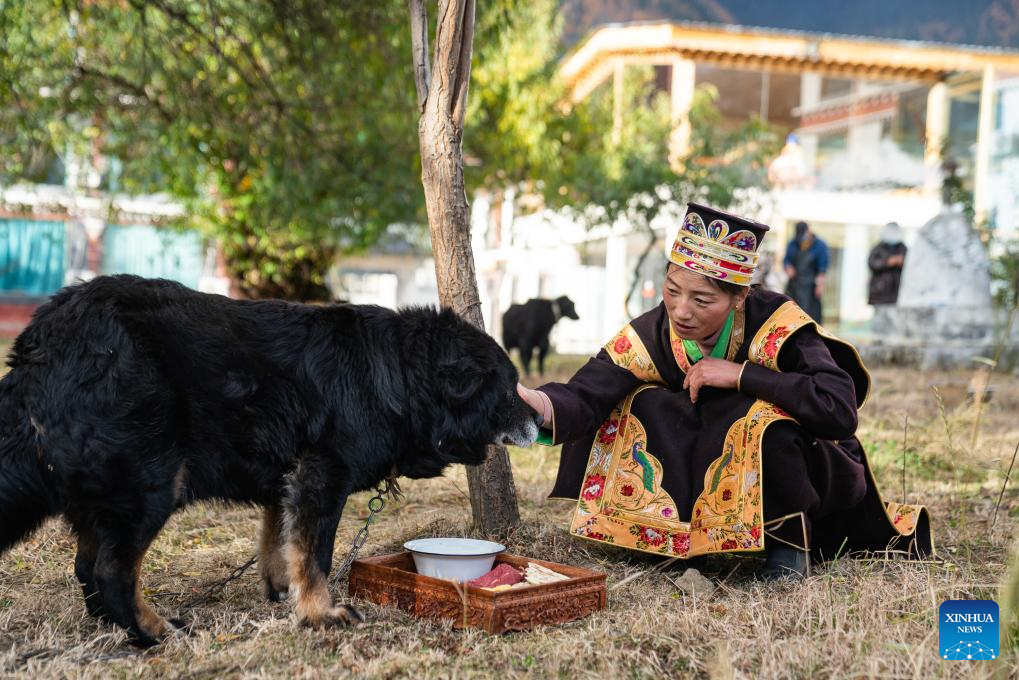
Lhagba Zhoima feeds a dog in Suosong Village of Nyingchi, southwest China's Xizang Autonomous Region, Nov. 14, 2023.
Locals in Nyingchi follow the tradition to celebrate their special New Year, known as the Gongbo New Year, on Oct. 1 by the Tibetan calendar, which fell on Nov. 14 this year. Tsering Toinzhub and Lhagba Zhoima have run a homestay since 2013, bringing in more than one million yuan (about 137,187 U.S. dollars) every year. For their family, the traditional Gongbo New Year is still the most important festival. (Xinhua/Tenzin Nyida)
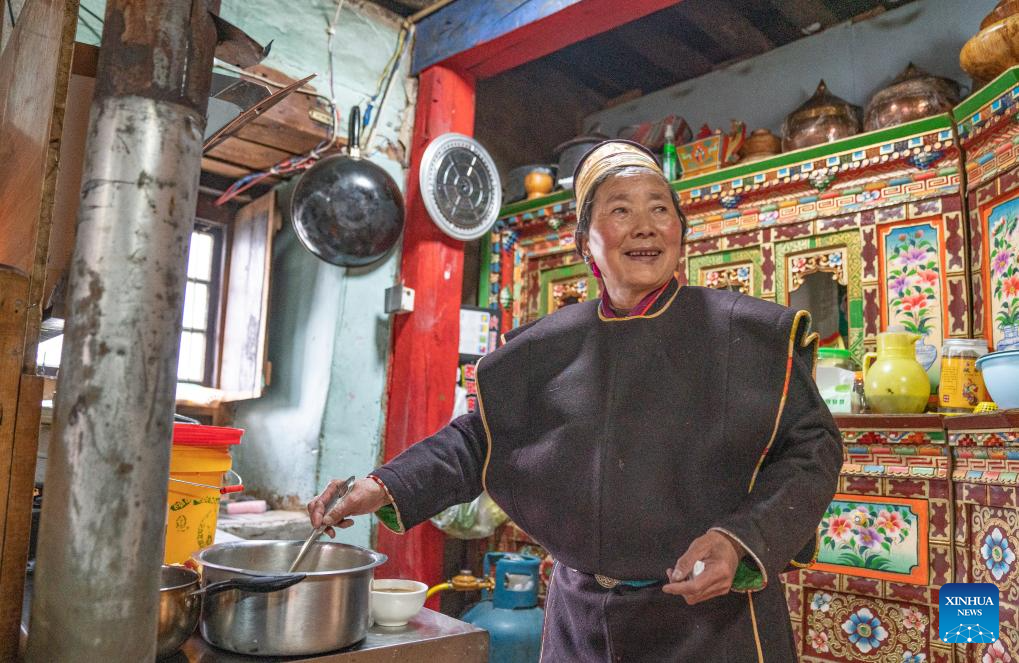
Tsering Toinzhub's mother checks highland barley wine in Suosong Village of Nyingchi, southwest China's Xizang Autonomous Region, Nov. 14, 2023.
Locals in Nyingchi follow the tradition to celebrate their special New Year, known as the Gongbo New Year, on Oct. 1 by the Tibetan calendar, which fell on Nov. 14 this year. Tsering Toinzhub and Lhagba Zhoima have run a homestay since 2013, bringing in more than one million yuan (about 137,187 U.S. dollars) every year. For their family, the traditional Gongbo New Year is still the most important festival. (Xinhua/Tenzin Nyida)
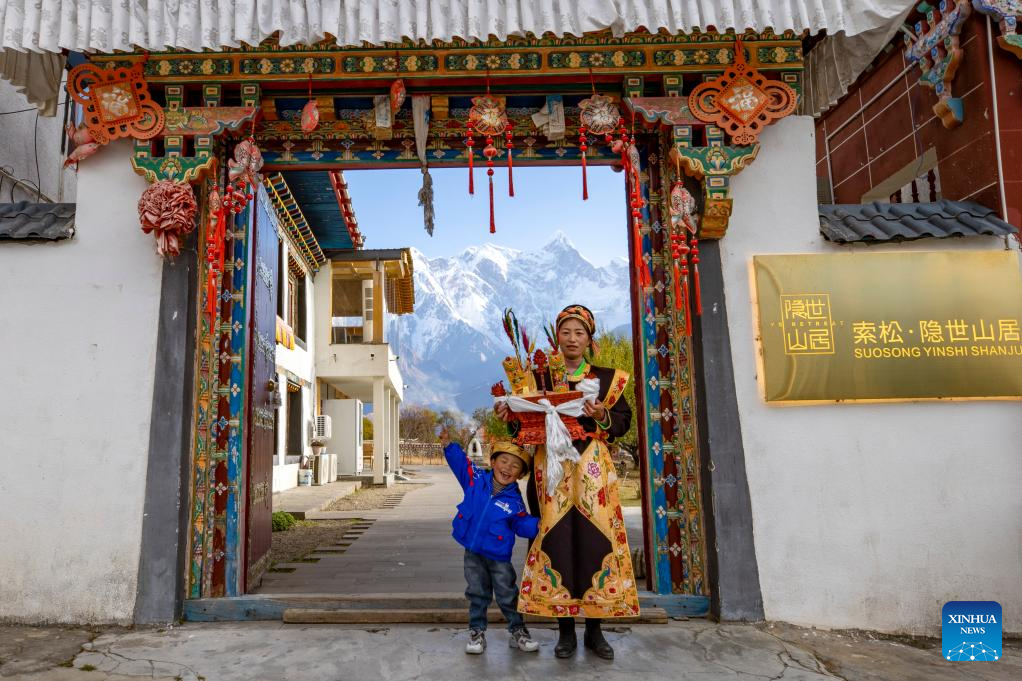
Lhagba Zhoima and her son pose for a photo with chema, a two-tier rectangular wooden box containing roasted barley and fried wheat grain, in front of their house in Suosong Village of Nyingchi, southwest China's Xizang Autonomous Region, Nov. 14, 2023.
Locals in Nyingchi follow the tradition to celebrate their special New Year, known as the Gongbo New Year, on Oct. 1 by the Tibetan calendar, which fell on Nov. 14 this year. Tsering Toinzhub and Lhagba Zhoima have run a homestay since 2013, bringing in more than one million yuan (about 137,187 U.S. dollars) every year. For their family, the traditional Gongbo New Year is still the most important festival. (Xinhua/Jiang Fan)
点击右上角![]() 微信好友
微信好友
 朋友圈
朋友圈

请使用浏览器分享功能进行分享
